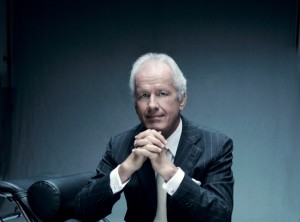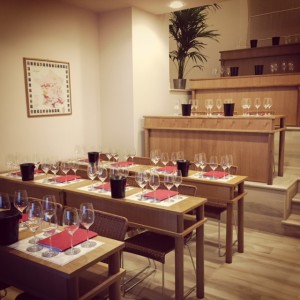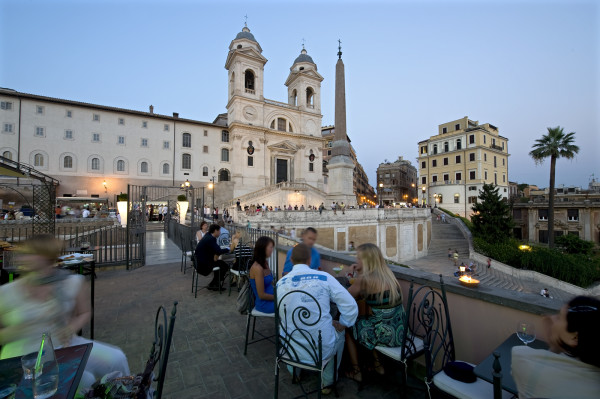
Italy’s Prime minister Matteo Renzi explaining his honorary sommelier diploma to Pope Francis
So Pope Francis doesn’t enjoy only sweets, especially, ice cream. He drank Italian wines with his meals in the Philippines and only two days after his return on January 21 he received a delegation of some 180 Italian wine producers, vintners, sommeliers, and wine writers at the Wednesday morning papal audience in Vatican City’s Palazzo Nervi. The meeting was organized by Franco Ricci’s Fondazione Italiana Sommelier (The Italian Sommelier Association) and led by him. “The idea of asking for a papal audience came to me,” said Ricci, also the editor of the Italian wine guide Bibendum, “because of Pope Francis’ many references to wine in his preaching. For us producers, sommeliers, and vintners, it is an important honor and encouragement for our work.”
In fact last February Pope Francis, whose paternal grandfather Giovanni was a wine producer in Piemonte and gave him a particular taste for Grignolino, made news when he said “ without wine, there’s no party,” referring to the wedding feast at Cana. Imagine finishing up the feast drinking only tea.” He also said: “The older a wine is, the better it gets, referring to Jesus’ expression, “No one after drinking old wine wants the new, for they say, the old is better.” Perhaps not surprisingly there are some 224 references to wine in The Bible.

Lambrusco for the Pope
Pope Francis also uses wine as a metaphor. On several occasions he has compared the heart to a fine wine, saying that the heart that isn’t luminous is like a bad wine; with time it spoils and becomes vinegar. On another occasion he said that the elderly are like a fine vintage wine with the power to give us this noble inheritance.”
Members of Ricci’s delegation included the well-established producers, Marilisa Allegrini; Piero Antinori; Jacopo Biondi Santi; Antonio Capaldo; Marco Caprai; Alessandro Ceci; Enzo Ercolino; Angelo Gaja; Carlo Guerrieri Gonzaga; Niccolò Incisa della Rocchetta; Chiara Lungarotti; Marina Mascarelli Cvetic; Giancarlo Moretti Polegato; Marco Palanti; Francesca Planeta; Luciano Sandrone; Lucio Tasca d’Almerita; Vincenzo Tassinari; Francesco Valentini; Ornella Venica; Maurizio Zanella; and Nadia Zenato, as well as newcomers (longtime left-wing politician Massimo D’Alema and journalist/author Bruno Vespa), and the highly-respected oenologists Riccardo Cotarella; Donato Lanati; Franco Bernabei; and Barbara Tamburini. Also present were top sommeliers and wine jounalists.
Much to Ricci’s relief, Pope Francis denied rumors that he drinks only mate tea, an herbal infusion typical of several Latin American countries. “I’m not a teetotaler,” he confessed in response to oenologist’s Cotarella’s inquiry; “I drink a little wine from Italy and other countries around the world. But just a little.”
Ricci’s delegation gave the pope a tastevin, a diploma as “honorary sommelier,” and a crate of three bottles of red wine chosen by Bibenda and kept secret (because the Holy Father did not want to promote specific producers), as well as one of olive oil. Not to mention that Ceci Cellars in Torrile near Parma dedicated a bottle of its Otello Nerodi Lambrusco to mark the occasion. Wrapped in white velvet and imprinted with theVatican State seal, the pope’s name is written in yellow (with white the colors of the Vatican flag) Swarovski crystals.

Steph and Tim Busch, the Owners of Trinitas Cellars present Pope Francis with his namesake wine
Epilogue: Ceci Cellars is not the only cantina to dedicate a wine to Pope Francis. So has Trinitas Cellars, founded in 2002 and owned by devoutly Roman Catholic Tim and Steph Busch with their CEO son Garrett, in the Napa Valley. One of several wines in their “Faith Collection,” Cabernet FRANCis 2012 costs $75 a bottle; another RatZINger, a 2008 zinfandel, $35.
The same evening half-way across the Eternal City, at the bottom of the Spanish Steps, at Via del Bottino 8, fifth-generation hotelier Roberto Wirth, owner/director of the iconic luxurious five-star Hotel Hassler, reinaugurated his International Wine Academy of Roma (IWAR), a small, boutique hotel with four rooms, a panoramic terrace wine bar, a private event space with a secret garden, a library, and a salon with a fireplace.

Roberto E. Wirth
“Until I first opened in 2001, there was nothing of this kind in Rome, and nothing similar opened after it closed at the end of 2009. At the new International Wine Academy our wine-loving students can invent their personalized course of study,” Wirth told me at the inaugural celebration. “They can narrow it down to their personal tastes or break out and discover new enological horizons. At this time we are not offering certification, though that might change.”
From February 5th to May 28th the International Wine Academy of Roma has organized a calendar full of activities dedicated to all those passionate about the world of wine and interested in discovering Italy’s extraordinary eno-gastronomic traditions. The program of classes and activities will be conducted by oenologist and published wine-expert Jovica Todorovic, formerly a freelance editor at Bibenda Editore and a co-founder and still a collaborator of Unoevino. Todorovic has an informal and entertaining educational approach meant to engage students in a cultural experience. The schedule includes: a six-session Wine Appreciation course, 5 vertical wine tastings, 2 Tasting Stands, 3 Focus classes, and 4 Wine Pairing Dinners” prepared by Neapolitan Francesco Apreda, Chef of the Hotel Hassler’s restaurant Imàgo which has had one Michelin star since 2008.

New classroom at IWAR
The Wine Appreciation course explores the different types of wines: sparkling wines and champagnes, white wines, red wines, and dessert wines. The vertical wine tastings instead explore the vintages of a particular wine producer, Azienda Agricola Principano: Barolo Boscareto on February 5; Castello di Montesanto: the Chianti Classico Riserva II Poggio on February 12; Chianti Classico Solare on April 9; Azienda Agricola Enrico Gatti: The Franciacorta on May 21; and Tenuta Dettori: Dettori Rosso on May 28. The Tasting Stands are a journey to discover the different wines from a particular Italian region: Etna on February 26 and Abruzzo on April 23. The Focus classes are an in-depth exploration of three particular types of wine: White Burgundy on March 19, Red Burgundy on March 26; and Riesling on May 7. The Wine Pairing Dinners are on February 19, March 5, April 16, and May 14 at a cost of 90 euros per person. It isn’t necessary to attend a wine course to reserve.
When I asked Wirth why he’d reopened the Academy, he gave me an answer similar to the one in my interview “Roberto E. Wirth: Born a Hotelier” (Epicurean-Traveler.com, February 2007). “The Wine Academy is my jewel, my passion, my hobby,” he said. “I still want to promote little known, top quality Italian, but not only Italian, wines, so that with Todorovic’s expert guidance our wine-loving students can build up their own wine-lover’s cellar.” To my question: Your favorite wines? he gave me the same diplomatic answer: “For obvious reasons I can’t give you a list of specific wines and producers, but in general I prefer Italian dry white wines, especially the ones that are still unknown or newly-discovered. Part of my pleasure is discovering new wines. That’s my goal for the Academy’s students.”

